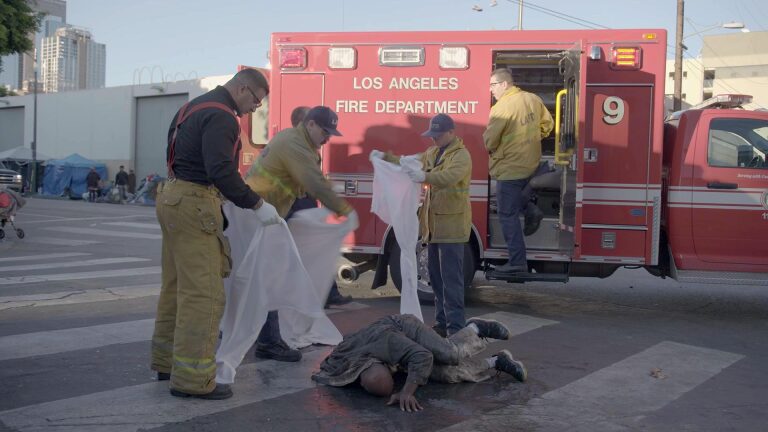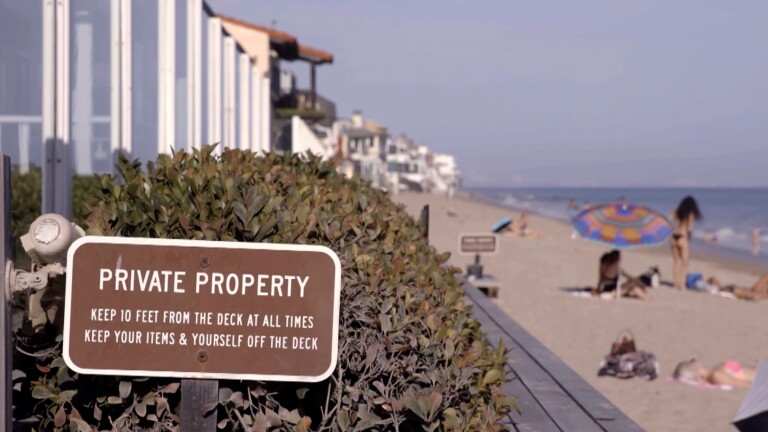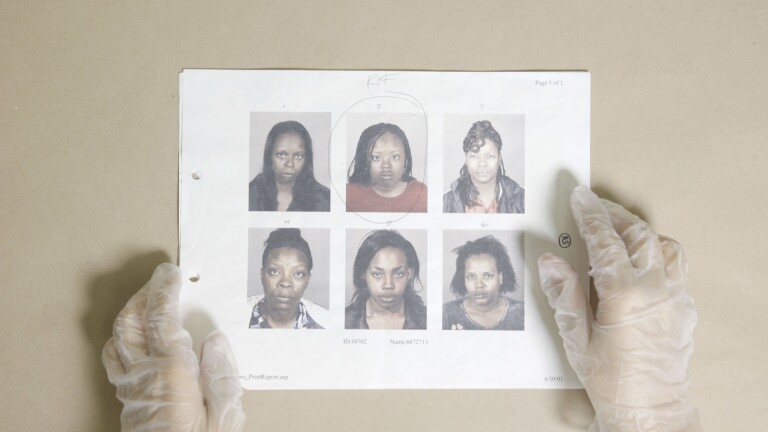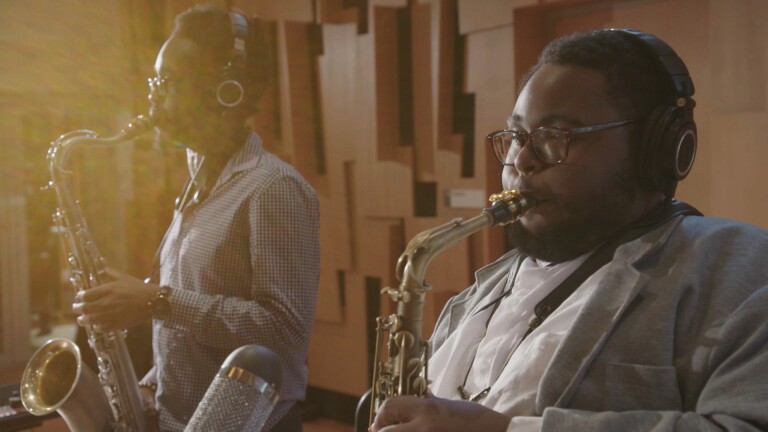
RX Dangers
Prescription drug use is now the leading cause of accidental deaths in the US. Recent celebrity deaths attributed to prescription drugs have brought the issue to the media forefront. However, painkillers, anti-depressants, and stimulants found in common household medicine cabinets are affecting regular families across the country. For some in Southern California families, the problem hits tragically close to home.
TRANSCRIPT:
Michael Okwu [to Kathy Creedon]: What's this one?
Kathy Creedon: This is when he was in eighth grade in Palm Desert Middle School marching band. That was before everything started going downhill.
Okwu: He's such an All-American looking kid.
Okwu: Kathy Creedon's son Ryan was a boy any mother could have been proud of.
Creedon: He was in marching band. He was a straight-A student. He loved going to school. He played every sport imaginable: karate, soccer, basketball, T-ball.
Okwu: But that was before things changed, before his teenage years, when Ryan began experimenting with drugs.
Creedon: He was introduced to prescription drugs through a roommate from what I have been told. And that became his drug of choice then. There was never any more meth, or cocaine. From that point on it was prescription drugs, the opiates and narcotic pain relievers that really took him down.
Okwu: So when Kathy Creedon dusts off old pictures, she is haunted by her son's transformation from a fresh-faced kid into a full-fledged drug addict. And angered at a system she believes enabled that addiction.
Creedon: He got really, really thin. You could see the bones sticking out of his shoulders, and he was just skin and bones. So when I finally would see him, and I would look at him and say,"Ryan what are you doing?" he still wouldn't admit he had a problem.
Okwu: Kathy says by the time Ryan was a young adult, he had become adept at manipulating doctors to prescribe him a variety of pills for everything from back pain to anxiety.
Okwu: Do you think that the fact that the drugs were legally prescribed led him to believe that he wasn't hurting himself?
Creedon: I think you are absolutely right, because when I would find him under the influence and say, "Ryan, how many pills are you taking? Your words are slurring. You can't stand up. You've taken too many of the pills" — he would justify it by saying "All I am doing is taking the pills the doctor gave me."
Okwu: Pills that a cast of doctors prescribed him time and time again. Even after Kathy told anyone who would listen that Ryan had become a drug addict.
Creedon: So every time something would come in the mail saying he had a doctor's appointment, I would find out who the doctor was and try to get my foot in the door and go alert the doctor to the history of abuse and addiction that he had to these narcotics.
Okwu: In 2008 and 2009, Ryan Creedon overdosed on prescription drugs multiple times. He was also in and out of rehab and arrested for trying to alter a prescription. And yet, Kathy says, he still managed to persuade doctors and pharmacists to provide him with more prescription pills.
Creedon: I remember driving down the road in my car while I was on the phone thinking, "Oh my gosh, I cannot believe this. My son has overdosed numerous times and nobody is willing to help me figure out how to save my son's life."
Okwu: Ryan's HMO was Kaiser Permanente, and its doctors and pharmacists were the source of at least some of the medications he abused. Kaiser officials said they can't comment specifically on Ryan's case because of privacy, but they did speak to us about the guidelines they use to prescribe these drugs.
Dr. Joel Hyatt [Kaiser Permanente]: We are in the business of treating patients. And patients come to us complaining of pain, depression, stress, whatever. With regard to prescription drugs, you know, we want to trust our patients. We want to believe our patients when they are complaining about pain, for example. And my job is to help people. So first things first, we want to make sure that we're appropriately managing pain.
Okwu: Ward Blanchard, now a friend of Kathy's and a former addict himself, says abusers learn how to take advantage of health care providers.
Ward Blanchard: Whether it's anxiety or red eyes or leaning to one side, doctors' manuals will list those symptoms specifically, and so I will read those, start to understand what the doctor is looking for, and I will tell the doctor what he's looking for.
Okwu: Ward, a one-time star athlete, says he practiced perfecting his act.
Blanchard: I would dress up like a golfer. I would put khaki shorts on and a nice polo shirt on. I would put a tee in my mouth and a visor on and a golf glove in my back pocket and zip up my golf cleats and go inside an urgent care with a hurt back that I just hurt on the 18th hole with a nice long drive and I just dropped my club as soon as I hit my ball. And felt it all the way up my back, all the way up the side of my back. He would sit there and he would push on my back and of course it didn't hurt one lick. But if he pressed one spot, I would jump and jerk and that's it, he was done, he was sold, he was hooked. And I would walk out minimum 30 mg oxycodine pills. Minimum.
Okwu: Today Blanchard speaks to health care providers about addiction. He's hoping he can help other parents avoid the nightmare Kathy Creedon suffered with her son Ryan.
Blanchard: One thing that I try to get across to doctors is that a drug addict is thinking about that drug every minute of every hour, every hour of every day, every day of every week, every week of every year. And he is thinking about you a lot more than you are thinking about him. And he's going to find a way to get you. And that's just the way it is.
Okwu: In the fall of 2009, while helping her daughter move into her college dorm, Kathy Creedon got a call from her son's roommate, the call she'd been fearing for years.
Creedon: And he told me that there was something wrong with Ryan. I started calling all my friends, asked if they could hurry up and get over there, something was wrong with Ryan. A few minutes later I couldn't wait. The paramedics arrived at the same time I called back. By then my friend was there. And I heard in the background the paramedic give the news to my friend on the phone, and that was how I found out that my son had passed away.
Okwu: Sadly, his story is not uncommon. From 2004 until 2008, the estimated number of emergency room visits linked to non-medical use of prescription drug has doubled in this country.
In Orange County, more than 200 young people have died from prescription drug overdoses in the last three years.
That grim statistic inspired two Orange County moms to produce a documentary they call "Overtaken."
[Dialogue from film]: Out of 15 friends back home, probably five of them are dead, and the other 10 are still doing exactly what I was doing. Most people can't kick this thing.
Okwu: We sat down with several of the young people featured in the film, all now clean and eager to warn others at risk.
Okwu [to the group]: So let me ask you this, just by a show of hands, how many of you were hooked at some point on prescription drugs? All of you.
How many of you raided your parents' medicine cabinets, or some other adult's medicine cabinet? Not you, Aaron?
Cole Edwards: You go into your mom's pill cabinet. You know, you go into your friend's mom's pill cabinet.
Okwu: Cole Edwards is 21. He says he started using OxyContin at the age of 15.
Edwards: For a year, I got it from my best friend's mom. She was prescribed that she had multiple surgeries. She didn't need as much as, you know, she had, and so she'd sell it.
Okwu: She'd sell it to you.
Edwards: To the high school kids, yeah, not just to me.
Okwu: So she was dealing prescription drugs.
Edwards: Oh, yeah. Absolutely.
Okwu: Twenty-nine-year-old Aaron Rubin survived a coma brought on by an accidental overdose of OxyContin and other prescription drugs. The former football player is now quadriplegic. He communicates by using hand gestures, raising one finger to say yes and two for no.
Okwu [to Aaron]: Do you ever feel frustrated by the inability to warn people about your own experience? Yes is what I'm hearing there.
Okwu: According to the U.S. Drug Enforcement Administration, 40 percent of teens think prescription drugs are safer than street drugs, and a third believe they aren't addictive at all.
Andrea: It's something that happens with families that, you know, have health insurance, that are in more affluent areas that can afford these things. And we don't want to talk about it. No one wants to admit they have a problem.
Okwu: Dr. Matt Torrington is an addiction specialist. He agrees privileged teens are more at risk.
Dr. Torrington: I think middle class and upper middle class people have more access to these medications because they have more access to healthcare.
Okwu: That's what we heard from the young people we met. Taryn's mother moved to Orange County for its good schools.
Taryn Waring: Like, I used to be a cheerleader, and I did graduate, you know, on the honor roll and all that, and I was running around on the streets. And I was in jail. And I'm on probation, and, you know, that's where this disease has taken me.
Dr. Torrington: When you take an 80 mg pill of OxyContin and crush it, that was like pharmaceutical grade heroin. And I don't think anyone realized how dangerous that was going to be until the patients started abusing it and getting very, very addicted to it.
Okwu: Even many doctors didn't realize the dangers, at first. OxyContin's maker, Purdue Pharma, paid more than $600 million in criminal and civil penalties stemming from an FDA investigation into the way it was marketed, including claims about its addictive qualities.
The company says those practices have long since ceased. And it has reformulated OxyContin to make it harder to abuse. But the trend toward prescribing more pain killers hasn't stopped.
Dr. Torrington: In 2009, enough hydrocodone was prescribed for every man, woman and child in the United States to take four miligrams four times a day for two weeks. We're talking about tremendous amounts of medication.
Okwu: Andrea started using drugs at the age of 16.
Andrea: In the beginning, it made me personally feel like everything was okay, and I think that's the part I liked the most. It took away all my worries. It made me not care. After a while, that, that wears off, and all that the drug does for you anymore is make you feel not sick. You know, you're lucky if you can just get up and walk around for the day.
Okwu: Taryn, the former cheerleader, says addiction took her to desperate places.
Taryn Waring: I was drugged by one of my drug dealers. And I was raped, and I woke up, and when I started fighting against him, he said, "If you move again, I'll, I'll kill you." At the time, all I'm thinking about is, I have to get high so I can block this out, so I don't have to think about this. I don't want to talk to my mom, I don't want to talk to my friends, I don't want to talk to anybody. I just want to get high so I don't have to feel like this.
Okwu: Tough to talk about.
Waring: Yeah....
Okwu: Taryn, Andrea, and Cole told us that their appetite for OxyContin led them to illegal street drugs.
Edwards: It began with OxyContin. And, uh, and that was my drug of choice for a long time. And that became too expensive, so then I moved on to heroin.
Okwu: That's right, heroin is now cheaper to buy than OxyContin. And the buying and selling of prescription pills for recreational purposes has become big business. So we came here, to the streets of Downtown L.A., to see just how easy it is to buy them.
Okwu [to Sgt. Stephen Opferman]: So this is a whole marketplace here.
Opferman: Yes. You can still buy crack cocaine and heroin or whatever you want down here. But they're more discreet about selling it. You know, for some reason they just — the pills are pretty much sold openly.
Okwu: We took a drive with Sgt. Stephen Opferman of the L.A. County Sheriff's Department and the Health Authority Law Enforcement Task Force, or HALT. He asked us not to reveal his face on camera because of his undercover investigations.
Opferman: That guy in the orange shirt, they're about to do a deal right now, with the older guy.
Okwu: He's not trying to hide this.
Opferman: No. You see it? He just ate one, then he walked away.
Okwu: In the course of about 30 minutes, we see several transactions happen on this corner, right in front of, of all places, a pharmacy.
Opferman: There she goes. She just handed her the pills right now. She just put them right in her hand, yeah.
Okwu: So we decide to get a closer look.
Okwu [undercover, to a woman on the street]: What have you got?
Woman: Vicodin.
Okwu: That's it?
Woman: And 'pin. Klonopin.
Okwu: Vicodin and what else?
Woman: And Klonopin and Valium.
Okwu: When I approach her, she offers prescription pain killers, and an anti-anxiety medication, which, when taken together, create an intoxicating effect.
This black market, says this undercover officer, has gotten the attention of criminals who have devised lots of ways to get their hands on valuable prescription drugs, including stealing doctor's IDs and creating phony prescription pads.
Opferman: This is a real doctor. They've actually used his real license number and his real DEA number. But the address is fake and the phone number is a prepaid phone number. It's very well thought out, very well planned, very well organized.
Opferman [on the street]: This is a common meeting spot for what we call cappers, recruiters, people who recruit, people who have Medicare cards.
Okwu: Opferman says criminals are also taking advantage of laws designed to make prescription drugs affordable.
Okwu: Here's how it works: organized crime outfits hire middlemen called cappers. The cappers entice Medicare recipients to ride with them to pill mills where the Medicare recipients pick up prescriptions from willing doctors. The cappers then take them to pharmacies to pick up the drugs which, under Medicare, are free. The cappers pay the Medicare recipients a few hundred dollars for the drugs, which are then sold on the black market for a profit.
Opferman: If I get 90 OxyContin tablets, I can sell that for at least $2,000 now.
Okwu: Sgt. Opferman's team was part of a sting that led to indictments against a Los Angeles drug ring that allegedly sold $900,000 of OxyContin pills on the street, generating millions of dollars in profits.
So what are the solutions to the prescription drug epidemic? The DEA sponsors events where you can dispose of unused pharmaceuticals. Government officials are also calling for a prescription monitoring system. California has one, but it's voluntary and doctors have to sign up for it.
Dr. Torrington: You know, the patient comes in and says they have a back problem, and they take about 30 Vicodin a month, but you're able to see that last month they had 120 prescribed. You know, it's easier for you to say, "Listen, you had 120 pills prescribed last month. What's really going on?"
Okwu: Health giant Kaiser Permanente says its doctors have decreased their prescriptions of OxyContin by 60 percent since January of 2010, and it has initiated safeguards against the overprescription of OxyContin and other commonly abused drugs.
Dr. Hyatt: So we put up all these barriers to prescribing OxyContin. We have actually inserted various alerts and warnings that come up any time a physician attempts to prescribe, let's say OxyContin or Opana, one of the other drugs of abuse. So these kinds of alerts keep us on the ball.
Okwu: As for Kathy Creedon, she has formed a non-profit called Mothers Against Prescription Drug Abuse and has been working with Congressperson Mary Bono Mack on legislation that would make it more difficult for doctors to prescribe drugs like OxyContin.
Creedon: That's what the legislation is all about is to make it mandatory that before they can renew, they will be required to get this training. And I believe in my heart that they will be more careful about it when they understand the seriousness of addiction.
Okwu: But in a culture where an ever-increasing array of powerful addictive drugs are just a medicine cabinet away, where criminals are driven only by the sure windfall of supplying steady demand, legislation alone might be a little like bringing a knife to a gunfight.






















